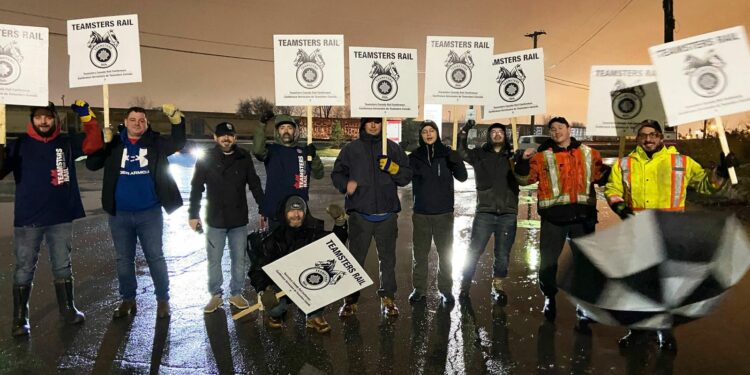
The railroads are making demands that ensure the continuation and increased frequency of similarly terrible, but entirely preventable, accidents in the years to come. TCRC President Paul Boucher stated that CN wants to extend already notoriously long workdays for rail workers in provinces west of Ontario and impose a relocation policy to meet labour shortages that could force workers to move away from their homes for up to 90 days. Paying workers by scheduled shift rather than miles travelled could result in rail workers being assigned to other tasks if they reach their destination ahead of time, rather than being able to clock out as they can currently. These concessions, he acknowledged, would “drag working conditions back to another era.”
Demands from CPKC include more flexible working arrangements that would make it harder for workers to know when they will be called to work, producing, in Boucher’s words, a “fatigue-related safety risk,” and would loosen restrictions on how long workers can be held away from home. CPKC also wants to delay the start of “held-away pay,” payments that workers receive when they spend time away from home between shifts. The change would be in line with extended breaks mandated by a May 2023 law that requires a minimum rest period between shifts when rail workers are away from home for 12 hours.
The TCRC offers no way forward for workers to resist these outrageous demands. It has presided over massive concessions in every recent bargaining round, and it intends to do the same again this time. The very fact that the companies are in a position to lock out the workers as they take strike action is primarily the result of the Teamsters’ foot-dragging and their refusal to challenge the anti-worker collective bargaining regime enforced by their allies in the Liberal government.
In 2022, the Teamsters waited until Canadian Pacific locked out the workforce before calling a strike. And no sooner did the strike begin than the union caved in and, at the government’s urging, agreed to a binding arbitration process that resulted in virtually all of the companies’ demands being written into the contact.
The Teamsters bureaucracy has no desire to lead a struggle at a time when the prices of commodities are high and the shipping of war materials to the US/NATO-instigated war on Russia is in full swing. This is because the union apparatus in the Teamsters and all other major unions is fully committed to Canadian and US imperialism’s wars through their corporatist alliance with big business and the government.
Workers must take matters into their own hands by forming rank-and-file strike committees to broaden their struggle. It must be broadened to rail workers in the US and Mexico to bring the entire North American railroad network to a halt. It must also be broadened to other sections of the working class across Canada, including autoworkers, resource workers, and workers in the public sector, all of whom confront sweeping attacks on their pay and conditions from the same forces seeking to impose concessions on railroaders.
In opposition to the nationalist and pro-capitalist Teamsters bureaucracy, whose main concern is defending the interests of the corporations and government against the workers, rank-and-file CN and CPKC workers must fight for a socialist and internationalist program to secure safe and secure jobs for all, an end to public spending austerity, and a halt to imperialist war.
On this basis, the railroads can be deployed to serve the needs of the vast majority of society, the working class, not the profiteering and warmongering of a tiny few at the top.
Sign up for more information about how to join or build a rank-and-file committee in your workplace
Source link : http://www.bing.com/news/apiclick.aspx?ref=FexRss&aid=&tid=66cbbb2e21274ed9974e30e186096d26&url=https%3A%2F%2Fwww.wsws.org%2Fen%2Farticles%2F2024%2F08%2F22%2Fohpg-a22.html&c=13558792471679530175&mkt=en-us
Author :
Publish date : 2024-08-21 13:28:00
Copyright for syndicated content belongs to the linked Source.












